Repos are gone. Dollar liquidity swaps dropped further. SPVs fell to lowest since June 17. MBS dropped by $37 billion. Treasuries rose.
By Wolf Richter for WOLF STREET.
Week seven since peak balance sheet: Total assets on the Fed’s balance sheet for the week ended July 29, released this afternoon, fell by $16 billion from the prior week, to $6.95 trillion. Since June 10, when they’d hit $7.17 trillion, they have declined by $220 billion:
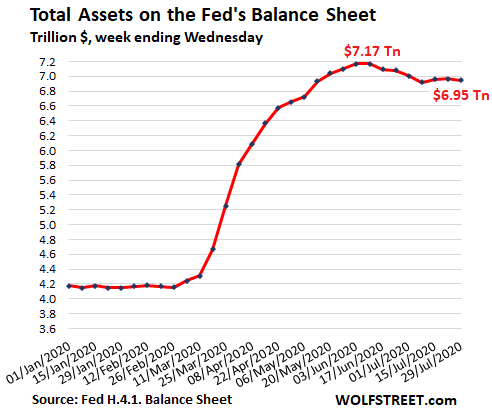
Repos are gone, week 4.
After the Fed made repurchase agreements less attractive in mid-June by raising the bid rate, they fell out of use, though the Fed is still offering them:
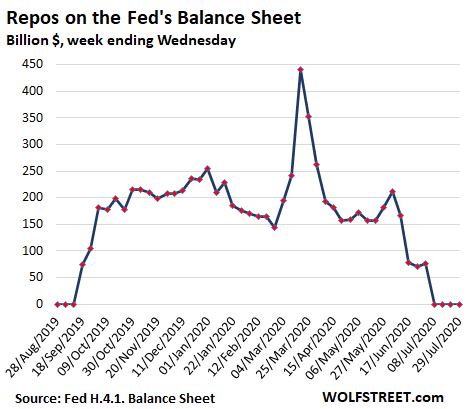
Central-bank liquidity-swaps dropped by $5 billion.
The Fed’s “dollar liquidity swap lines” – which provided other central banks with dollars during the crisis – are falling out of use, though the program itself has been extended, just in case. This was the seventh week in a row of declines, now down to $117 billion:
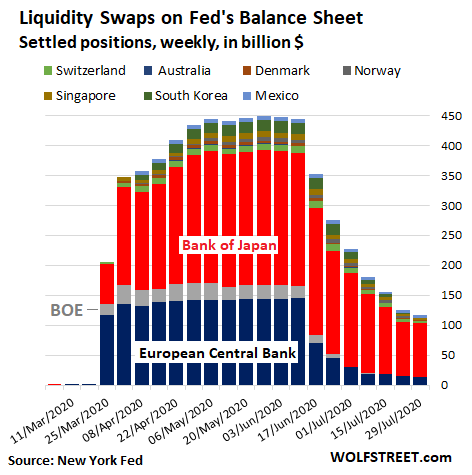
SPVs & Loans fell by $3 billion, to lowest level since June 17.
Special Purpose Vehicles (SPVs) are LLCs that the Fed created and that it lends to. The US Treasury Department provides equity capital to the SPVs. The SPV then buys assets or lends.
- PDCF: Primary Dealer Credit Facility
- MMLF: Money Market Mutual Fund Liquidity Facility
- PPPLF: Paycheck Protection Program Liquidity Facility
- CPFF: Commercial Paper Funding Facility
- CCF: Corporate Credit Facilities: includes the SMCCF (Secondary Market Corporate Credit Credit) and PMCCF (Primary Market Corporate Credit Facility). Buys corporate bonds, bond ETFs, and corporate loans.
- MSLP: Main Street Lending Program
- MLF: Municipal Liquidity Facility
- TALF: Term Asset-Backed Securities Loan Facility
In addition, there is Primary Credit (“Pr. Cr.” in the chart), which are loans the Fed makes directly to banks.
The balance of these entities combined dropped by $3 billion from the prior week to $208 billion, the lowest since June 17. But note how the composition has changed: The original three entities are being phased out, as new ones have been added. The PPP loan facility is by far the biggest ($71 billion):
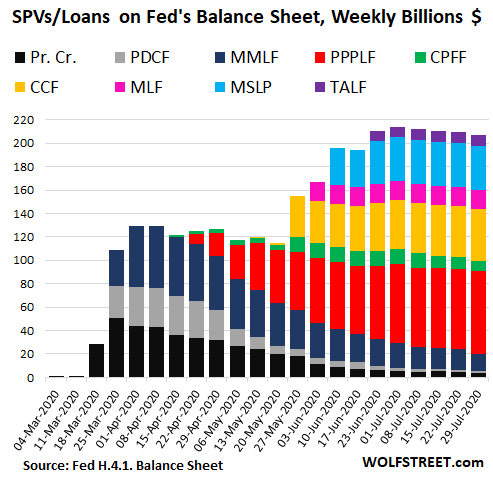
MBS fell by $37 billion, to $1.93 trillion.
Mortgage-backed security balances are erratic on the Fed’s balance sheet, for two reasons:
Pass-through principal payments, which are triggered when mortgages get paid down or get paid off, have turned into a torrent during the current mortgage refi boom. They reduce the balance of MBS on the Fed’s balance sheet, and the Fed has to buy large amounts of MBS just to keep the balance level.
MBS trades, which take 1-3 months to settle, are booked on the Fed balance sheet only after they settle. The timing between unpredictable pass-through principal payments and the settlement of MBS purchases is wildly different. Hence the jagged chart.
The change in MBS balance today (-$37 billion) reflects purchases from 1-3 months ago that settled during the week, minus current passthrough principal payments:
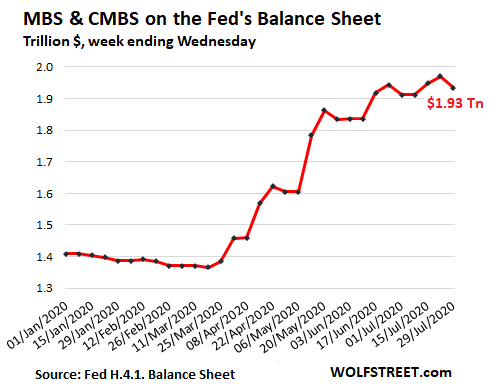
Commercial mortgage-backed securities (CMBS) are included in the balance of MBS – one of the bailout programs the Fed kicked off in March. These are “Agency CMBS” – secured by apartment-building mortgages that are fully guaranteed by Fannie Mae, Freddie Mac, and Ginnie Mae – are a relatively small portion of the CMBS universe.
CMBS secured by retail and hotel mortgages have come under severe strain, with default rates that have spiked to 18% and 24%. But the Fed’s purchases of Agency CMBS are in the still relatively sanguine category of apartment properties. And they are guaranteed by the government.
The program was launched with huge fanfare, but after a few weeks of buying, the Fed’s purchases petered out, and the balance has been essentially flat since June 10, and at around $9 billion, it remains small by Fed standards. Unlike residential MBS, CMBS purchases settle quickly:
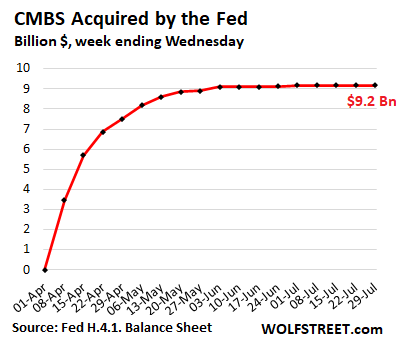
Treasury securities rose by $34 billion.
After having ticked up last week at the smallest rate all year (+$6 billion), the balance of Treasury securities this week rose by $34 billion, to $4.29 Trillion. The varying levels of increases in recent weeks and before March are related to the twice-a-month dates when maturing Treasury securities are redeemed, and when the Fed books those redemptions (Fed gets its money back from the government).
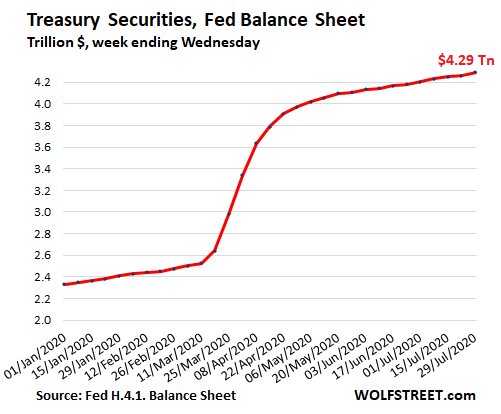
Enjoy reading WOLF STREET and want to support it? You can donate. I appreciate it immensely. Click on the beer and iced-tea mug to find out how:
Would you like to be notified via email when WOLF STREET publishes a new article? Sign up here.
![]()


WR: do you think the breakout in gold /silver is any factor in the Fed’s calculus?
I don’t think so (obviously I have zero data to back up my assertion).
Does anybody recall if Volker had that in mind when he jacked up the interest rates ~ 40 years ago? Weren’t people piling into gold until he raised the rates through the roof?
I recall that the Hunts announced a silver backed bond, i.e., a piece of paper you could carry around. Shortly after, Volcker told the Chicago exchange to refuse contracts for delivery and only for liquidation. At least once the Fed has reacted to a move in silver.
The Hunts were not just PO’d, they were scandalized, as though Volcker had revoked the Ten Commandments.
The spread between rates and inflation had gotten out of hand, and the two correlate. Saw this in one of Hussman’s charts. Below 5% rates/inflation very little correlation, above very much. Fed wants to play with the same dynamite now. The notion that low interest rates beget inflation has been proven false. The problem is running negative real interest rates.
I remember seeing Volker in an interview, much later on, saying that when as Fed Chairmen he checked the price of gold every day. I am too lazy to try to find a clip on Youtube or whatever.
Wolf,
What do you make of tech earnings today? It seems nothing can stop these companies and valuations can keep soaring. Holding a large short on the S&P. Wondering if you think anything can break the tech bubble at this point.
Skara,
In terms of Big G, let me re-post what I posted in reply to someone else in another thread just now:
Big G, which reported its first revenue decline, is squeezing* my income hard – and it’s squeezing* other publishers’ income hard – to make its own quarterly earnings look better. But for publishers, there is no way around Big G these days. You always have to deal with it somewhere. And publishers are completely helpless.
That company needs to be broken up into several pieces. Publishers are folding and filing for bankruptcy left and right because their ad revenues are falling year after year, and now more so than before, while Big G, FB, and increasingly Amazon are getting fat off the ad business, by being middlemen and owning the ad infrastructure and ad exchanges, and they suck the lifeblood out of the publishing business.
*the technical term for what it is doing is to publishers is the F-word
Thank you for the reply, and hang in there I suppose.
I am just blown away by the results today. I thought for sure with millions losing their jobs people would pull back on new phones, tablets, and gadgets…and with companies being crushed by the pandemic ad budgets would be chopped significantly. It is almost as if the opposite happened. That plus QE infinity and these companies have infinite valuations.
If GDP crater, massI’ve unemployment, and Global pandemic can’t even dent these companies, something is wrong.
You forgot CARES.
Look at the chart of XLY (consumer discretionary)and XRT(con essentials) – BOTH are at 52 wk high ytd!
50% of consumption (of 70% consumer spending) is contributed by the top 10% who own nearly 90% of wealth of Wall St! They can afford all the digital gadgets+!
I think stimulus spending was larger. It’s gone now.
I think it’s because of the $600/week. 5/6 people who received that money made MORE. While some people responsibly saved the extra money or paid down debt, others bought crap they didn’t need. Given that many stores were closed, and if open, people were nervous to go, it’s not out of the realm of possibility that a lot of that money went to Amazon.
@ RightNyer
Most of the consumption in USA is debt supported for the last 3-4 decades. The rate of growth in wages are virtually stagnanr since
90s!The bottom 60% even use them for needs in addition to wants! Live for today and worry later, right?
They just following our Govt with re spending!
My observation closely mirrors yours. People were spending more, and I think they were skipping rents to splurge also. I don’t have data to back up my later statement, but it has to be true. iPhone sales were pretty much “flat” the previous quarters, but suddenly we had an 8% bump in the Americas. Where the hell did that come from?
Also TSMC, AMD, Qualcolm, etc are reporting VERY STRONG demands. Chip sales is usually a leading indicator. TSMC is even saying that demand is exceptionally strong even with reduced business from Huawei.
Consumers are flush with money. There’s no reason for further stimulus. I certainly don’t want to help deadbeats, etc who skip their rents to splurge.
I don’t like unions, but it seems to me the way to F them, both big g and big u, is to seek protection by joining an established union, either as a journalist or film creator. Both of these categories of content creation have unions that represent the industries. By seeking protection from the union there would be no way for any platform to demonetize creators. An equitable and transparent fee structure could then be established.
Petunia – ask Disney about unionizing creators.
If it wasn’t for unions, bosses would have everyone working 18 hours a day for 7 days a week for 50 cents max. Divide and conquer is the maxim of all employers. The trick is to keep politics out of the equation, and the union bosses have to remember that their only job is to look after their members as best they can.
Mark Z went off script yesterday morning complaining about Amazon’s growing reach in the ad business.
At this rate, Amazon will be the government soon.
You replied to my post on the other article, but you didn’t say anything about Facebook. FB had a blowout quarter.
When we have a so called “depression”, it’s not a reach to say that companies will cut their marketing budget, but seems like this is not happening despite multiple companies stating they will do so.
Something odd is happening.
MonkeyBusiness,
You’re drawing the wrong conclusions from the big 4 earnings reports.
Companies have cut their market budgets big time. Google’s ad revenues are down. But when you get a lot more users, that covers up the decline in ad revenue per user, or per page.
My site traffic is up 35% year-over-year. My site traffic has been increasing every year, but not like this. I’m having a huge year, in terms of traffic. But ad revenue per page is down a whole bunch, and my overall ad revenue, despite the surge in traffic, is down, but not as much as it would be without that surge in traffic.
The WSJ, the NYT… they have all reported the same thing: big user growth, and in their case, big growth in subscription, but a sharp decline in ad revenues.
This is the worst ad recession I have ever seen, and it is being widely reported. And I see it confirmed on my own site.
Maybe, or maybe Amazon is butting in and total ad spending remains the same across all platforms. FB and Amazon might be eating some of Google’s lunch.
I’m in the same boat with HIBS. Germany has the worst GDP since 1970 and the US worst since the depression, yet the market, after tanking goes up almost to even. If the FED is not doing this, are we to believe the Robinhooders have this much influence?
Big picture is Fed balance sheet is up 10x in 11 years to $7 trillion.
What’ll it be in 10 years time? $70 trillion?
That’d put gold at $75,000/oz. $750 x 10 x 10.
Has you seen any one from either of the party complaining about deficit or the DEBT? Repubs wants spend 1 Trillion vs 3 Trillions by Dems, going forward! No difference between the WARFARE or the WELFARE party!
Read a detailed ILLUMINATING analytical article by Morgan Stanley analyst – Mr. Ruchir Sharma under the Review section of WSJ (July 24th) titled ‘ Rescuing ruining the Capitalism”
Need to be read all FOMC members! Also a good read for B of Directors at WSJ!
A few excerpts:
‘With more debt to fuel the same amount oTinf growth, capitalism bogs down.
-The rising culture of government dependence is, in fact, a form of socialism—for the rich and powerful.
-The ‘Zombie’ Economy
Ever fewer startups are launching in the U.S.,while the number of publicly tradedcompanies that can’t even pay interest ontheir debt is grow
-For all their good intentions, they(FED) will continue to feed the dysfunction that is alienating younger generations and deforming capitalism.
Sunny,
Don’t you think it’s a little late in the day to be worrying about debt? No one worried about it for tax cuts just a few years ago.
Call me old fashioned, but when times are supposedly good, like during the strongest economy the World has ever seen just 6 months ago (or was it last month?), isn’t that when you pay down debt and have money in the bank for emergencies? It that were the case the Fed shenanigans wouldn’t exist today.
This whole situation reminds me of someone coming home from an incredible vacation, walks into the opulent mega mortgaged home, and finds a pink slip in the pile of mail.
Tax cuts are much less a problem then unrelenting increasing spending.
I graduated high school in the dotcom blowup, college right before the 2008 blowup. I wasn’t equipped to do well after either of those, so I spent the last decade getting prepped for the next one and now it feels like they’ve changed the rules of the game. It’s aggravating seeing the plates wobbling for the last few years and their insistence on trying to keep them spinning (hence my username). Prudence is punished while overextension gets you protection.
Weary Patients, you have under estimated the number of thieves in the room as well as their reach of influence.
Wolf, now I feel Amazon will go to $5000. Sure sign it crashes.
Amazon is going to get dinged in the post-CARES spending slowdown. Apple is another. I-Phone shipments slowed down in July and it will slowdown more.
That is why Apple refused to release forward guidance.
Doesn’t matter if Apple didn’t release one. Their main supplier TSMC, remains bullish and their market cap has just surpassed Visa.
Amazon also guided sharply higher.
Big mistake by Apple to not lower guidance in the 3rd quarter. It will come out in September causing puts to like up causing a crash.
Many COs in S&P have completely skipped offering guidance for future qtrs! AAPL is not exception!
Should be priced in
The other thing to note is that while the tech companies results were good, they STILL don’t justify their valuations. If the justification for the high valuations were that earnings growth would catch up to them, then they shouldn’t be going up again, as that growth should be “priced in.”
Rather, they should only have gone down if they missed.
So what does it take for FAANG valuations to revert to the mean? Discount rate is zero. Fed is pouring liquidity into markets. Pandemic makes the mighty even mightier no matter how many are unemployed…
Good news, bad news…market keeps going up.
The Fed is not pouring liquidity into the markets. It’s a CARES bubble with hospitals buying a lot of tech. Forward demand pump.
‘they STILL don’t justify their valuations’
LOL!
The whole mkt(s) remain overvaluated, over bought and over hyped since Jan of 20! The Mkt cap to GDP is over 150%! Any time it goes 90% the economic growth is very limited!
If NOT for FED where all these stocks would be, in this 3rd largest everything bubble of 21st century?
FED is the market!
The Fed is tone deaf. As these mega semi monopolies report ginourmous earnings, all it ever says is that it will continue to give as much free trillions to the markets forever and ever and ever. It should learn some new tricks it’s current repetoire is looking a bit unseemly.
The Fed’s balance sheet might shrink short term, but Democrats want to tag another 3 trillion onto that balance sheet. It’s why the dollar is tanking and the stock market will continue to rise. And we all know if Biden wins, you can tag another few trillion onto the Fed balance sheet for his green new deal and the extension of Amtrak service to every town in the nation (Biden likes trains).
Google, FB, Apple are irrelevant to what’s driving the market. Only the devaluation of the dollar matters.
P.S – This post is not an endorsement for the purchase of stocks. You can make other bets that are much closer to the action without the interference of analysts, dilution or other stock related nonsense.
I suspect Europe starts vaccinating in December and US in January. This will drain liquidity, indirectly.
Never underestimate the monetary value of controlling information.
Dollar sank through two year lows in 3 weeks. I don’t hear too many parrots talking about the cleanest dirty shirt much lately. Lying about normaliziztion of interest rates and removing liquidity is not even attempted. The lie worked in 2011 not now. Jerome looks like he was awaiting execution by drowning in zombie land bond paper. Pretend and Extend is a nice warm blanket of cognitive Dissonace.Shit Storm is a coming. I just read where the Senate wants to gnaw $200 off on my next $1200. Bastards. I am exceptional and I want my money.
I am extraordinarily exceptional and deserve $2000.
I don’t think I have seen a RD Blakeslee comment lately.
his most recent (that i am aware of) blog post was less than a week ago. hopefully he is busy doing something important around the homestead.
What happened to that guy, Michael Engels or something, that would make a list of chart analysis-type statements that to me were opaque, but added up to some strange sort of poetry?
He gets busy in the summer with his farm. But if he doesn’t show up here soon, I’ll check on him since we’ve been in contact for years. I did this before. And he said, yeah, been busy with my farm.
Thanks for the update Wolf. It looks like the Fed is in waiting mode right now and will only print more when there’s a serious correction.
I was also surprised at how well the Big Tech’s earnings were today. IMO much of what’s keeping the market afloat is FOMO which causes money to flow right back in after each substantial dip. TINA is also the other big reason. Both in GFC and dotcom, bonds were an option with much better yields, particularly in 2000. After having made a killing since 2015 in the stock market, people are hardwired to just buy the dip, no matter the macro economic situation. They know that if they don’t, all the others will and they’ll just miss out on a good entry point…FOMO!
I don’t think Robinhood’ers or retail players even in aggregate can make a dent in the markets. Big money still far outweighs retail by a long shot. The slowness we’ve seen this week and in the preceding weeks can be explained by many if not most of the big players taking profits since early June and watching where we go from here in terms of the trajectory of the virus spread and further stimulus from Congress.
I have a $350,000/yr job + bonus that requires me to trade something, anything, every hour of every workday. What could go wrong?
Exactly.
Does the rolling off of dollar liquidty swap lines contribute to the weakening dollar?
I’m always puzzled by calling FB tech. It uses tech, like NBC uses tech. How does an ad co become tech? AMD is tech, Intel is tech, MS is tech but FB is a customer of tech. Albeit a skillful one.
The point is that an economy built on ads and hamburger joints makes 1929 look like a concrete foundation.
And in 29 consumer credit was virtually nonexistent.
FB’s scale dwarfs NBC’s. Remember FB connects 2 or 3 billion people all over the planet. To connect people from all over the world, knowing what they like, recommending things based on what they and people in their network like, etc, etc, at that scale requires them to build their own tech. In the tech industry, the problems that Google, FB, etc encounter are called planet sized problems.
The US is too big to fail and yet the US dollar is losing value daily.
It looks to me like big money wants out of the US dollar but doesn’t want to spook the heard.
Why is the Fed shedding assets during a pandemic created financial crisis?
This is not the time for the Fed to be shedding assets unless they are preparing for a much bigger problem. The devaluation of the US dollar continues to accelerate.
”This is not the time for the Fed to be shedding assets unless they are preparing for a much bigger problem.”
You NAILED it GW IMHO, after watching as closely as possible all of the above on here and several other so called financial sites not nearly as well done as WS.
Seeing these really incredible and dangerous moves by FED, especially since 2006, I have been paying a lot more attention to try to figure out how to hedge against both the deflation, with which I am OK today, and the very likely humoungoussss inflation that is inevitable later.
(BTW, thanks for the RDB update Wolf; having farmed a lot in my past lives, this can be a very heavy work time, especially if he’s irrigating.)
Wolf, are you still short on the market?
Yes. The market has essentially gone nowhere since then. My position is down something like 3%. Meh.
BTW, at the moment, the S&P 500 (which is what I’m short) is in the red.
The S&P 500 has gone nowhere since June 8.
Wolf,
When you say you are short the market, do you mean net short?
Taps Coogan,
One of the lessons I learned in late 1999: if you think the market is heading down and you short it (back then I shorted the worst high-flyers), don’t do it until after you’re totally out of the market.
Short-selling means you sell equities you don’t own. But before you do that, and you feel you want to short, you should sell the equities first that you do own. That’s the first step in shorting. Then the next step is you sell the equities that you don’t own.
That’s just my lesson learned the hard way. Because this shit happens in sequence: first stocks rise, and you get killed on your short, and cover the short at a huge loss; then the expected crash comes, and you get killed on the stocks you were long.
But even if you get the timing right, shorting while being also long the same asset class makes zero sense, unless…
You need a hedging strategy, or you don’t want to pay taxes on gains this year or whatever, and so you short for other reasons. And if it that works for you, fine. But that’s not what I’m doing.
In other words, I’m completely out of the market before I even think about shorting the market.
Aren’t you afraid of additional stimulus package injection into the market?
No, I’m not afraid of that. It only takes a few seconds to cover the short. So if I see a big shift, I’ll cover. I shorted the SPY, which is a slow-moving large ETF that tracks the S&P 500. It’s not going to quintuple in one hour, like KODK did.
Stimulus packages go into consumption, they tend not to flow into asset prices, though they prop up consumer spending.
All of what the Fed DID in March and April flowed directly into asset prices. This has stopped now. The Fed is now shifting to propping up consumption rather than asset prices. And we have seen that in the S&P 500 over the past 7 weeks (essentially flat).
But if suddenly the Fed shifts back to inflating asset prices, I’ll cover the short. But I doubt the Fed will do that.
Is Kodak the greatest short idea ever?
Wolf, thanks for monitoring the FEDs balance sheet so closely. What is your take on the current extreme weakness of the dollar.
I don’t think the dollar is seeing “extreme weakness.” The dollar is down a bunch from early in the crisis when it had spiked. But it’s right at the bottom of the range of all of 2019 and it’s substantially above where it had been in early 2018.
I look at the BUXX, which is the WSJ dollar index. It has a much broader currency basket that includes the currencies that the US trades the most with, such as China and Mexico. The DXY is too narrow. It is dominated by the EUR. It holds only 4 European currencies, the yen, and the CAD.
Mr. Richter, thanks for the update and also for the tip on BUXX. Looking at a three year chart for BUXX it seems that the November 2017 high could turn out to be the support for 2020.
And yet stock indexes are at record highs. May be its more the perception of FED liquidity that drives prices higher.
No, “stock indices” are NOT at record highs. The NASDAQ was. The S&P 500 is not at a record high, and it has not moved since June 8, and the Dow is not at a record high either, and the DOW at the moment is down 165 points, and the S&P is down 10 points at the moment, subject to change :-]
Fed is going to buy the dip in balance sheet reserves. Congress fighting over 1T/3T, remember when they shut down government over a 5B border wall. Whew.
With sentiment indicators at record highs (commitment of traders, put call ratios, publications about the demise of the USD etc) it seems that we are at the final stage of the up move in equities and gold. The CLO market is ripe to crash given forbearance agreements meaning a strong dollar as a multi year risk off scenario unfolds. Once the selling starts USD cash is king.
It is unfair that ordinary Americans should share at all in government aid money. It should all be reserved for the parasitic financiers — as usual.
Public anger with the financial parasites protected by their “Federal” Reserve may be so high now that it is backing off temporarily to avoid having any action taken against it or its precious banksters after November. However, I would be very careful if I was another politician proposing changes to these parasites’ cozy system, and I would want many bodyguards.